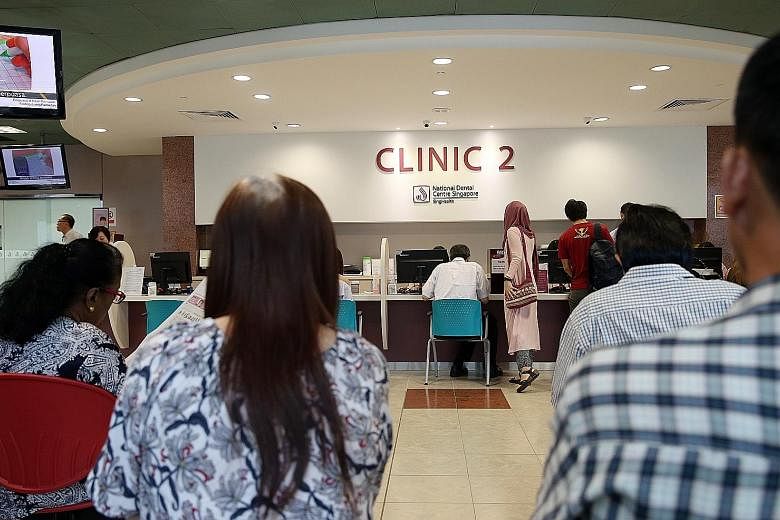In a bid to clear its huge backlog of patients waiting for treatment, the National Dental Centre (NDC) has extended its clinic hours for certain treatments by an hour.
This comes after a report by The Straits Times in March that highlighted the arduously long waits of up to a year or more that some subsidised patients have to endure to get specialist dental care. This is in spite of the NDC adding 52 more dentists since 2012, bringing the total to 146 by the end of last year.
The extension of operating times to 6.30pm for three days a week started last month. It covers periodontics, or the treatment of severe gum disease, due to the higher demand for this service. This was the problem facing the patient highlighted in the previous article.
NDC's director, Dr Poon Choy Yoke, said demand for subsidised dental care has grown significantly, with the centre handling 160,849 patient attendances last year, a 50 per cent rise from 107,237 in 2012.
Significant increases were seen in "age-related" dental specialities like endodontics, which includes root canals and cracks; and prosthodontics, which covers crowns and dentures - services that are often linked to an ageing population.
Aside from periodontics, demand for other "elderly" services remains high.
The median wait for subsidised crowns and dentures had gone up by two months between 2012 and last year, when half the patients had to wait more than eight months to get crowns and more than 10 months for dentures.
However, the median wait for subsidised patients seeking root canal treatment at NDC has dropped to 7.6 months from 13.6 over the same period. The subsidised rate is slightly more than half the private rate and costs less than $500 for a complex case.
Tackling higher demand for services as society ages
Dr Lui Jean Nee, who heads endodontics at the NDC, said patients waiting for root canal treatment are given a 30-minute emergency treatment to keep the tooth stable and the patient free from pain until their root canal treatment, which could take two to three sessions, each lasting an hour.
Madam Pauline Yeh, 54, who was at the NDC for her first appointment last Friday, has to decide whether to have her tooth extracted and get an implant, for which there is no subsidy, or save the tooth with root canal treatment and put a crown over it.
This will be done at her next appointment, but the primary school allied educator is not in a hurry.
After the interim treatment she received, she said: "I don't have any pain, I can live with it."
Aside from the NDC, Khoo Teck Puat Hospital (KTPH) and the National University Hospital (NUH) have been providing subsidised specialist dental treatments since 2011 for the three services in high demand due to an ageing society - root canals, dentures and crowns.
The two hospitals have 65 dentists and account for about a quarter of subsidised specialist dental care.
The wait for crowns and dentures is the shortest at NUH, with a median of seven days. At KTPH, it is three months.
For root canal treatment, half the patients seeking treatment at KTPH had to wait a year or more.
The Ministry of Health (MOH) expects the situation to improve once the National University Centre for Oral Health opens in 2019.
Meanwhile, the team which is currently based at NUH has been ramping up its services and capacity.
From next month, it will start accepting referrals from private clinics under the Community Health Assist Scheme. It now takes referrals only from polyclinics.
Associate Professor Patrick Tseng, chief dental officer at MOH, said the key is for people to prevent dental problems, or not to let them worsen.
"One common misconception is that losing teeth is inevitable, but the majority of us can keep our teeth throughout our lifetime," he said.
All it needs is proper care including daily brushing and flossing, and annual visits to the dentist to spot and manage any problems early.
He added: "People with diabetes and smokers have more severe gum disease, and should take extra steps to monitor and maintain good dental hygiene."



